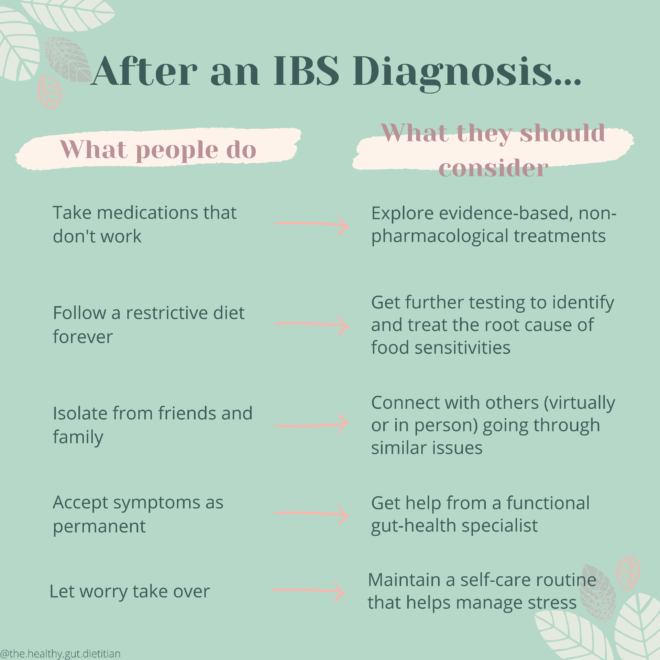
In my world, an IBS diagnosis is not the end of your gut health journey — it’s the beginning. But understandably, so many clients come to me feeling discouraged and hopeless after receiving an IBS diagnosis. I can speak from first-hand experience that there is hope for long-term relief — without the need for highly restrictive or isolating diets.
IBS is not well understood, which makes treatment challenging. While there is no test for IBS, potential causes like nervous system function, bacterial overgrowth in the gut, and early life stress have been suggested.
About 10-15% of the population is affected by IBS — women more than men.
I always recommend working closely with your physician and a registered dietitian, who can help you develop personalized treatment plans to feel better faster. But in the meantime, if you’re struggling with new or persistent IBS, these simple changes may go a long way in reducing your symptoms.
- Adjust your Diet
Everyone can benefit from eating mostly whole foods, but often IBS calls for a more tailored approach. About 75% of people with IBS benefit from a low FODMAP diet, which eliminates specific types of carbohydrates that people with IBS sometimes struggle to digest. It’s a great place to start, but keep in mind that low FODMAP is highly restrictive and is better used as a short-term tool to control symptoms and identify food triggers. The goal is to be able to enjoy as many foods as possible without worry – not endless restriction!
- Relax
Easier said than done, I know. Especially if IBS is the thing stressing you out — but it’s important to note that stress management is a big piece of the IBS-management puzzle. We can’t control how stressful our lives get, but we can build habits that help our bodies resist the effects of stress.
I recommend doing one thing every day to reduce your stress — exercise, meditation, prayer, time with loved ones. Additionally, practicing good sleep hygiene and mindful eating techniques to achieve rest and digest mode at mealtime.

- Call in Reinforcements
Navigating an IBS diagnosis alone can be frustrating and overwhelming. A functional dietician who specializes in gut health can run additional tests and provide tailored gut healing protocols, like supplements and diet changes, to help you find relief faster. If lifestyle and diet changes aren’t enough, your physician can prescribe medication to manage your symptoms.
Bottom Line:
An IBS diagnosis can leave you feeling hopeless — but in many cases, long-term symptom relief can be achieved without heavy restriction. And, you may even see benefits of these lifestyle and diet changes reaching beyond your IBS symptoms! The best place to start is meeting with a functional dietician who can build a personal protocol that leads to long-term relief.
If you’re struggling with IBS and want to get to the root cause of your symptoms, my gut health program might be right for you! Head to the link in my bio to sign up for updates and more information about the program.
- Eating Behavior (42)
- Grocery Shopping Tip (8)
- Gut Health (36)
- Healthy Eating (47)
- Low FODMAP (13)
- Nutrition Articles (31)
- Recipes (27)
- Uncategorized (4)



